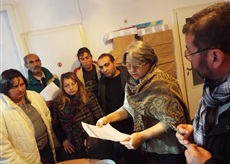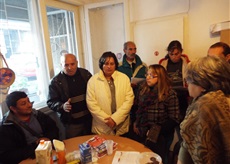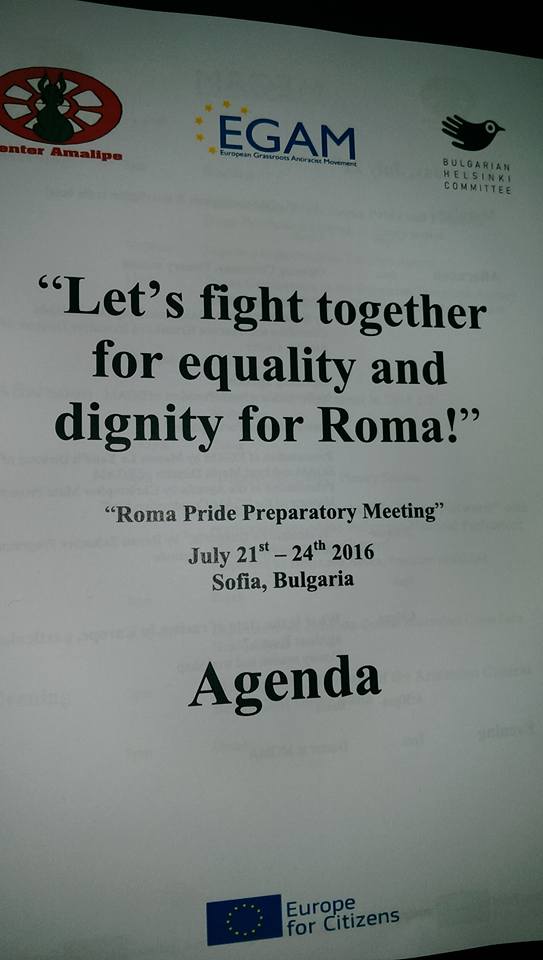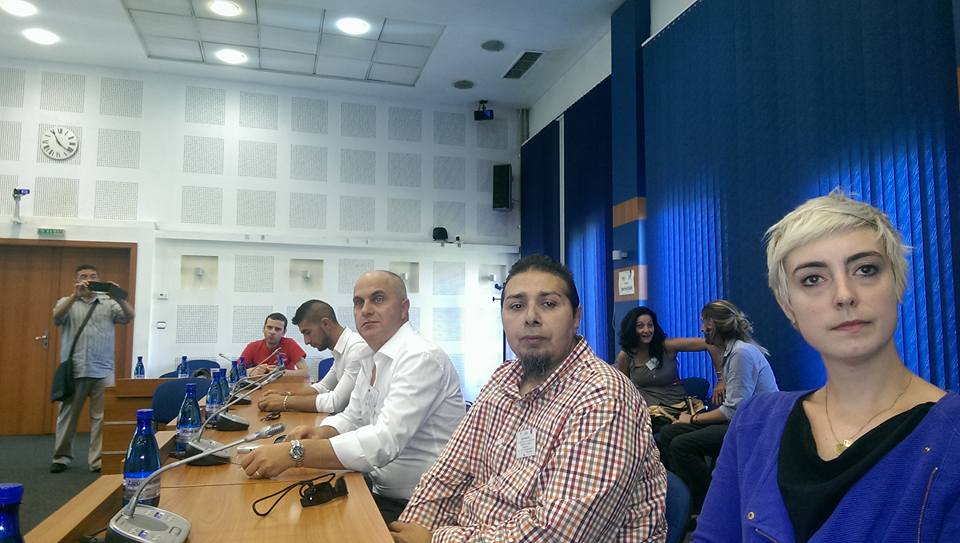01.08.2016An experiment in Pavlikeni shows how to increase the number of health insured people
Seven months after they recovered their health insurance status, ten Roma people from the municipality of Pavlikeni continue to support it by paying their monthly health insurance. It was a part of an experiment designed to increase the number of health insured people, organized under the program LERI (Empowering local level for Roma inclusion).
 In December 2015 Center "Amalipe" supported 10 active volunteers to the Center for Community Development - Pavlikeni to restore their health insurance rights by covering half of their payroll for the period from 01.01.2013 to 31.12.2015. The other half was paid by the volunteers themselves. By contract, which everyone signed with Center "Amalipe" volunteers took the commitment to regularly pay their health insurance after January 1, 2016, and to continue their voluntary work in the Center for Community Development - Pavlikeni, as well as in Byala Cherkva, Stambolovo and Batak. The moderators from the Centre for Community Development in Pavlikeni started to support the volunteers since January 2016 by including themin campaigns and increasing their motivation.
In December 2015 Center "Amalipe" supported 10 active volunteers to the Center for Community Development - Pavlikeni to restore their health insurance rights by covering half of their payroll for the period from 01.01.2013 to 31.12.2015. The other half was paid by the volunteers themselves. By contract, which everyone signed with Center "Amalipe" volunteers took the commitment to regularly pay their health insurance after January 1, 2016, and to continue their voluntary work in the Center for Community Development - Pavlikeni, as well as in Byala Cherkva, Stambolovo and Batak. The moderators from the Centre for Community Development in Pavlikeni started to support the volunteers since January 2016 by including themin campaigns and increasing their motivation.
Information for health insurance status indicates that each of the supported ones continues to be insured. Only two of the supported have been hired with an employment contract and their insurance are paid by their employer. Other two were small entrepreneurs, two of the women were housewives and others make their living through activities under civil contract or no contract. They pay their own health insurance. Three have missed one month.
The experiment showed that the combination of support and personal commitment leads to encouraging results. Individual work is the key to success to increase motivation and participating in community campaigns is crucial to change attitudes towards health insurance system.
 The experiment also shows certain weaknesses in policies to increase the scope of health insurance. Increasing the years required to return to the system (from January 2016 requiring paid contributions for five years instead of three, as it was at the end of 2015) increases the financial burden and reduces the number of persons who could return to the system. In rural areas, self-insurance is associated with additional costs: for example, two of the three supported have a gap of one month, because they pay payroll taxes once every two months in order to save travel costs and bank fees. The actual return to the system requires this to happen in the regional center, as the National income agency didn't have export centers in small municipalities.
The experiment also shows certain weaknesses in policies to increase the scope of health insurance. Increasing the years required to return to the system (from January 2016 requiring paid contributions for five years instead of three, as it was at the end of 2015) increases the financial burden and reduces the number of persons who could return to the system. In rural areas, self-insurance is associated with additional costs: for example, two of the three supported have a gap of one month, because they pay payroll taxes once every two months in order to save travel costs and bank fees. The actual return to the system requires this to happen in the regional center, as the National income agency didn't have export centers in small municipalities.
Project "Support for participation in the study of Roma integration at local level in the municipality of Pavlikeni" is financed within the program LERI (Empowering local level for Roma inclusion) of the EU agency for fundamental human rights. In Bulgaria the program was implemented in the municipalities of Stara Zagora and Pavlikeni as partners are respectively "World without Borders" and Center "Amalipe".
Seven months after they recovered their health insurance status, ten Roma people from the municipality of Pavlikeni continue to support it by paying their monthly health insurance. It was a part of an experiment designed to increase the number of health insured people, organized under the program LERI (Empowering local level for Roma inclusion).
 In December 2015 Center "Amalipe" supported 10 active volunteers to the Center for Community Development - Pavlikeni to restore their health insurance rights by covering half of their payroll for the period from 01.01.2013 to 31.12.2015. The other half was paid by the volunteers themselves. By contract, which everyone signed with Center "Amalipe" volunteers took the commitment to regularly pay their health insurance after January 1, 2016, and to continue their voluntary work in the Center for Community Development - Pavlikeni, as well as in Byala Cherkva, Stambolovo and Batak. The moderators from the Centre for Community Development in Pavlikeni started to support the volunteers since January 2016 by including themin campaigns and increasing their motivation.
In December 2015 Center "Amalipe" supported 10 active volunteers to the Center for Community Development - Pavlikeni to restore their health insurance rights by covering half of their payroll for the period from 01.01.2013 to 31.12.2015. The other half was paid by the volunteers themselves. By contract, which everyone signed with Center "Amalipe" volunteers took the commitment to regularly pay their health insurance after January 1, 2016, and to continue their voluntary work in the Center for Community Development - Pavlikeni, as well as in Byala Cherkva, Stambolovo and Batak. The moderators from the Centre for Community Development in Pavlikeni started to support the volunteers since January 2016 by including themin campaigns and increasing their motivation.
Information for health insurance status indicates that each of the supported ones continues to be insured. Only two of the supported have been hired with an employment contract and their insurance are paid by their employer. Other two were small entrepreneurs, two of the women were housewives and others make their living through activities under civil contract or no contract. They pay their own health insurance. Three have missed one month.
The experiment showed that the combination of support and personal commitment leads to encouraging results. Individual work is the key to success to increase motivation and participating in community campaigns is crucial to change attitudes towards health insurance system.
 The experiment also shows certain weaknesses in policies to increase the scope of health insurance. Increasing the years required to return to the system (from January 2016 requiring paid contributions for five years instead of three, as it was at the end of 2015) increases the financial burden and reduces the number of persons who could return to the system. In rural areas, self-insurance is associated with additional costs: for example, two of the three supported have a gap of one month, because they pay payroll taxes once every two months in order to save travel costs and bank fees. The actual return to the system requires this to happen in the regional center, as the National income agency didn't have export centers in small municipalities.
The experiment also shows certain weaknesses in policies to increase the scope of health insurance. Increasing the years required to return to the system (from January 2016 requiring paid contributions for five years instead of three, as it was at the end of 2015) increases the financial burden and reduces the number of persons who could return to the system. In rural areas, self-insurance is associated with additional costs: for example, two of the three supported have a gap of one month, because they pay payroll taxes once every two months in order to save travel costs and bank fees. The actual return to the system requires this to happen in the regional center, as the National income agency didn't have export centers in small municipalities.
Project "Support for participation in the study of Roma integration at local level in the municipality of Pavlikeni" is financed within the program LERI (Empowering local level for Roma inclusion) of the EU agency for fundamental human rights. In Bulgaria the program was implemented in the municipalities of Stara Zagora and Pavlikeni as partners are respectively "World without Borders" and Center "Amalipe".



 Under this motto passed the annual meeting of the European antiracist movement EGAM, which took place from 21 to 24 of July 2016 in Sofia. It was organized in partnership with Center
Under this motto passed the annual meeting of the European antiracist movement EGAM, which took place from 21 to 24 of July 2016 in Sofia. It was organized in partnership with Center





